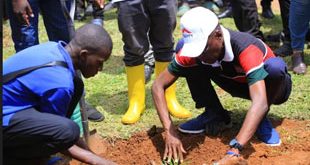Nothing wrong with Islam
But according to Platas’ research, even with policies of extremist groups like Boko Haram in Nigeria, there is little to suggest that there is something inbuilt in Islam that contradicts education.
She says those cases are outliers.
The good news is that there are attempts to overturn this historical injustice. The report notes that overall, achievements among the younger population are growing at a pace better than those from older generations with those with one or more years of primary schooling doubling from 21% to 43%.
The younger generation of Muslim women is also making educational gains, with those with no formal schooling dropping from 87% among the 55-74 year olds to 65% among those between the ages 25-34.
Dr. Abasi Kiyimba, a professor in the Department of Literature at Makerere University in Kampala, has also extensively studied this phenomenon. In a paper titled “The problem of Muslim Education in Uganda: Some reflections” that he published in 1986, he noted that the description of the gap in education accomplishment between Muslims and other religions in Ugandan could be based on understanding of the term “education”. He said the understanding is linked with Uganda’s historical experience under British colonial rule. He says the understanding is that only secular education is “education”.
Yet, he says, from the time Islam arrived in Uganda around 1844 and stayed without competition for 33 years, secular education was never their priority for the Arabs who came here mainly to trade.
The only education that was introduced by the Arabs was the Madrasa or the Q’uranic schools which sprung up to teach the converts how to read the Q’uran, how to write Arabic, and also help the person to pray.
“When one talks of education, one is almost immediately understood to refer to Western education; for this is the system of education left to us by our colonial masters,” Kiyimba says in the paper.
“This is the system the individual relies upon for recognition in Ugandan society, and his chances in life in Uganda and abroad depend on how ably he has distinguished himself in it,” he says, “This system is also used as the sole yardstick in Uganda, for determining whether a person is educated or not.”
This is an opinion that Sheikh Juma Bakint Cucu, the Secretary for Education at the Uganda Muslim Supreme Council (UMSC) shares. Sheik Cucu told The Independent on Jan.23 that when Christianity came in 1877, all that changed.
The business-like competition among the two groups of Christian missionaries (Anglicans and Catholics) made the missionaries amass as many converts as possible using education as bait. This locked out the Muslims and, according to Cucu, marked the beginning of the gap in education accomplishment that is seen today between Muslims and Christians in Uganda.
“If you were a Muslim, you would not go to a Catholic or Protestant –founded school,” he says, “This barrier made Muslims hate the arrangement because they were not willing to convert to Christianity.”
Nsereko Mutumba, the Spokesperson of the Uganda Muslim Supreme Council also told The Independent that through education marginalization, the British colonialists institutionalized the marginalization of Muslims in Uganda. He says it started with colonial Governor Harry Wilson who is quoted in a book, “Abasimba Obusiramu m‘Uganda” by another prominent Ugandan Muslim scholar Prof. A.B Kasozi.
In this book, Governor Wilson is quoted on Page 58, saying the British colonialists’ dream was to confine Islam to Sudan and have Uganda become a centre for Christianity in East and central Africa. That was in 1920.
Prof. Kasozi says in the book that Wilson was so bothered with the spread of Islam in Uganda that he even sacked a local administrator in eastern Uganda when he got news that the leader was spreading Islam.
To get around the obstruction of Muslim education, some Muslims adopted Christian names. Nsereko Mutumba, for example, says he adopted a Catholic name “Remegius” in the late 1960s to ensure he gets an education.
With that name, he was allowed into school by the Catholic fathers to study at St. Kaggwa S.S in Bushenyi. He says he did this because there were no Muslim-founded schools in western Uganda until the 1970s.
 The Independent Uganda: You get the Truth we Pay the Price
The Independent Uganda: You get the Truth we Pay the Price



What about the school in MBale run by the Abayudaya ? It is a Jewish school, although it accepts all who want an education, and has been praised for its excellence ?
This school should also be mentioned.